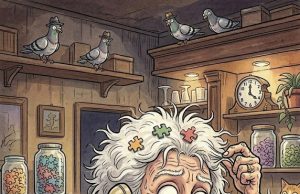“Don’t come to Thanksgiving. It’s family only.”
That was the text my daughter-in-law sent me after I emptied thirty years of savings—$620,000—to keep their house from being taken by the bank. I stared at my phone, reading the words again and again, as if they might change into something kinder.
They didn’t.
No explanation. No apology. Just a casual dismissal, like canceling a dentist appointment.
For a long moment, I just stood in my quiet kitchen, the same house where I’d cooked every holiday meal for decades. I could still see my late husband, David, carving the turkey while everyone argued over crispy skin and extra gravy. I’d lost him eleven years ago to a sudden heart attack—one minute complaining about the coffee, the next gone forever.
Grief had taught me how loud silence could be. That night, the silence in my house felt… different. Not empty, but waiting. Like something inside me had finally reached its limit.
I didn’t call to argue. I didn’t ask why. I typed two words:
“Okay. Noted.”
And as I hit send, something fundamental shifted. Years of swallowing hurt, explaining away rude behavior, accepting less and less from people I loved—it all settled into a hard, cold line inside me.
I put the phone down, walked to my closet, and pulled out a small locked tin box. Inside were documents my attorney had insisted I keep “just in case.” At the time, I thought he was being dramatic.
Now I realized he had seen clearly what I refused to admit.
Months earlier, my son Michael and his wife Jenna had signed those papers without really reading them. They were panicked and grateful back then, just relieved I was willing to help. Trusting me had been easy.
Respecting me, apparently, was not.
My name is Helen Parker. I’m seventy-one, barely five feet tall, with short white hair and very sensible shoes. People look at me and see “sweet old lady.” They assume I’m fragile, that I don’t notice things.
They’re wrong.
I notice everything—especially when people stop making eye contact, when invitations quietly disappear, when conversations die the moment I enter a room.
Michael was my only child—soft-hearted, generous, the kind of boy who brought home stray cats and gave away his lunch money. As a man, he kept that kindness…but never learned where to draw a line. Kindness without boundaries is just a different kind of weakness.
Then came Jenna.
From the first dinner he brought her to, I tried to like her. She arrived with flowers, praised my cooking, laughed at all the right spots. But the way she looked around my home made something in me prickle—like she was inventorying it, not admiring it.
They married quickly. The wedding was lovely and expensive. I helped with their first down payment. Over time, I watched as “Michael and Jenna” slowly became “we” and “we think” and “we decided,” until my son’s individual opinions just disappeared into hers. They came over regularly—mostly when they needed something: money, help, favors.
I gave. That’s what mothers do.
But over the years, the pattern became unmistakable: attention when they needed me, distance when they didn’t.
Six months before that Thanksgiving text, my phone rang at 11:43 p.m.
“Mom.”
Michael’s voice broke on the first word. I could hear Jenna sobbing in the background—loud, dramatic, almost performative.
“We’re going to lose the house.”
They’d refinanced, taken a bigger mortgage, opened a home equity line, invested in her cousin’s “startup,” upgraded the kitchen, gone to Italy, bought Jenna a new car. Every decision assumed future money would fix present problems.
It didn’t.
“How much?” I asked, even though my stomach already knew the answer would be bad.
“Six hundred twenty thousand.”
That number wasn’t just debt—it was my entire safety net. David and I had spent decades building it: an emergency fund, an investment portfolio, and a small rental house. Together, they totaled exactly $620,000.
If I gave it to them, I’d be left with almost nothing.

Every rational part of me screamed to say no, to let them handle the fallout of their own choices.
But mothers don’t decide with spreadsheets. We decide with memories of scraped knees and teenage heartbreak and how small our kids looked in hospital gowns.
So I did the thing that would change everything.
I agreed to help.
Before I transferred a single dollar, my financial adviser insisted on paperwork. My attorney, Jonathan, turned that paperwork into a formal agreement.
“It’s protection,” he said. “You’re giving away your entire safety net. You need boundaries.”
The agreement said three crucial things:
It was a loan, not a gift—$620,000, specifically to stop foreclosure on their home.
If they repeatedly mistreated or excluded me from major family events, I could call in the loan. If they couldn’t repay within thirty days, the debt would become a lien on their house, and I could force a sale.
If anyone lied about what really happened, I had the right to show the full agreement to anyone necessary—the “transparency clause.”
“It sounds harsh,” I told Jonathan.
“What’s harsh,” he replied, “is leaving you broke while they live comfortably in a house you paid for.”
When we met at a coffee shop, I slid the folder across the table. Jenna flipped through the pages as if she were scrolling past terms and conditions online. Michael barely skimmed the first paragraph.
“We trust you, Mom,” he said.
They signed without reading. At the time, I thought it was a sign of trust.
Now I see it was arrogance.
Within forty-eight hours, my accounts drained:
$60,000 emergency fund
$240,000 in investments
$320,000 of equity in the rental house
Gone. I was left with $12,000 to my name.
Michael called, choked with gratitude. Jenna promised they’d “never forget what you did.” They even hosted a little thank-you dinner.

For three weeks, everything was warm and attentive.
Then the pattern returned—only worse.
They began canceling our regular Sunday dinners:
“Work emergency.”
“Not feeling well. Rain check.”
I scrolled through social media and saw the truth: backyard barbecues, parties, dinner gatherings in the house my money had saved.
I wasn’t invited.
Once, I drove over with a hot chicken casserole, thinking a surprise visit might reconnect us. When Jenna opened the door, she froze.
Behind her, the table was beautifully set for a formal dinner with “work people.”
“Oh, that’s so sweet,” she said brightly, blocking the doorway. “But we’re in the middle of something. You should keep it and enjoy it yourself.”
“Who’s at the door?” Michael called.
“Just someone dropping something off,” she answered.
Not “your mother.” Just someone.
I drove home, the casserole cooling on the passenger seat. That night, I ate it alone and realized something simple and ugly:
They didn’t see me as family.
They saw me as a resource.
Still, I did what mothers do—I forgave, minimized, swallowed the hurt.
Then, two weeks before Thanksgiving, I texted Michael:
“Looking forward to having you both over on the 28th. I’m making your dad’s stuffing.”
He replied with a thumbs-up emoji.
The night before the holiday, as my table sat set and my turkey thawed, Jenna’s message arrived:
“Don’t come to Thanksgiving. It’s family only. We know you spent 620,000 to save our house, but we just want a simple private holiday. Thanks for understanding.”
There it was. No misunderstanding. No gentle phrasing.
“Family only.”
But not me.
I didn’t cry. I didn’t call.
I opened the tin box. I reread the agreement. I remembered every canceled dinner, every lie about “quiet weekends,” the night I stood on their porch with a casserole while they entertained inside.
Then I called Jonathan.
“I’m ready,” I said.
“Are you sure?” he asked. “Once I file, there’s no going back.”
“They told me Thanksgiving is ‘family only,’” I replied. “I think it’s time they learn what that costs.”
He sent the notice on Thanksgiving Day, right around the time they were carving their turkey: the loan was being accelerated; full repayment due in thirty days or the lien would take effect.
I slept better that night than I had in months.
The next morning, my phone showed eighty-seven missed calls and eighteen voicemails.
Michael.
Jenna.
Her mother.
His college friend.
Repeated, again and again.
I made myself coffee and let the phone ring.
Finally, I answered.
“Mom, thank God. This email—it says we owe $620,000 in thirty days. It’s got to be a mistake, right? You said we didn’t have to pay you back.”
“It’s not a mistake,” I said calmly.
“What? Why?”
“Because you broke the agreement you didn’t bother to read.”
He tried to blame the text on Jenna. She shouted in the background that he had agreed. They rang my doorbell over and over. I watched them from the front window, standing on my porch, frantic.
I didn’t open the door.

Days later, I finally let them speak to me outside—on my terms.
“You’re going to ruin us,” Jenna sobbed. “We can’t pay this. You’re nuking our lives over one text.”
“It was never just one text,” I replied. “It was a pattern. You took my money, then slowly erased me. Thanksgiving was simply the first time you said it out loud.”
Michael begged. Jenna raged. They called me controlling, vindictive, cruel.
“We’ll tell everyone what you’re doing,” she snapped. “We’ll tell them you trapped us with paperwork and are using money to control us.”
“Go ahead,” I said. “The agreement gives me the right to share every page, every clause, every text. When you lie, I’ll simply show people the truth.”
For the first time, Jenna went pale.
“You have twenty-six days,” I told them, and closed the door in their faces.
A few days later, the fallout started.
My sister called: “Jenna says you took the money back for no reason. That you’re destroying them over a minor misunderstanding.”
Neighbors, cousins, old friends—all repeating Jenna’s story: I was an unstable old woman who changed her mind and wanted control.
I’d expected this.
I sent Jonathan a list of everyone who had contacted me. He emailed each of them:
The full agreement
The text message: “Don’t come to Thanksgiving. It’s family only.”
A simple timeline of events
No commentary. Just documentation.
The response flipped overnight.
“I had no idea,” my sister said. “That text is unforgivable.”
My neighbor came in person to apologize for believing gossip.
Michael’s friend texted: “She left out everything that made her look bad. Everyone’s on your side now.”
And as the documents were forwarded from inbox to inbox, the narrative Jenna tried to spin collapsed.
She hadn’t expected that protecting myself meant I could also defend my reputation.
Then Jenna’s parents showed up at my door.
They weren’t there for understanding. They were there for damage control.
“Our entire circle has seen those documents,” her mother said stiffly. “This is humiliating. You need to ask people to stop sharing them.”
“I’m not the one forwarding them,” I replied. “I released them only to people who approached me with accusations. That’s what the transparency clause is for.”
“You trapped her,” her mother insisted. “You weaponized fine print against your own family.”
“No,” I said. “I protected myself from exactly this scenario: I help, then get painted as the villain when I finally say ‘enough.’”
They wanted me to be quiet, to absorb the damage while Jenna kept her good-girl image.
I refused.
“She’s our daughter,” her mother said at the door.
“And he’s my son,” I answered. “But nobody protected me.”
They left without changing my mind.
Then, finally, came the messages that mattered.
First from Michael:
“Mom, I finally read it. The whole agreement. I didn’t understand what I was asking from you. I’m sorry. I’m done letting her speak for both of us.”
I didn’t respond right away. I needed to see if this was real accountability or just fear talking.
Two days later, Jenna wrote a long, desperate apology. She admitted the Thanksgiving message was cruel, admitted she’d pushed me away because she hated feeling indebted, admitted she’d lied to people about what happened.

But the heart of her message was crystal clear: she wasn’t broken up about hurting me.
She was broken up that people knew she hurt me.
Her reputation was cracking. Her boss knew. Her parents were getting calls. Friends were looking at her differently.
“Please,” she wrote, “I’ll call everyone and tell them I was wrong. Just make this stop. I can’t take everyone judging me.”
She wanted me, once again, to rescue her from the consequences she created.
Just like with the house.
I sat in my quiet kitchen, surrounded by the ordinary comfort of my small, paid-off home. The life I had left after giving them everything: modest savings, simple furniture, old photos, and my own peace.
For months, I’d believed my worth was tied to what I could give. Money. Time. Food. Forgiveness. I’d accepted crumbs of attention because I was afraid of being alone.
But I’d been alone anyway—just alone in a room full of people who didn’t value me.
I picked up my phone and wrote back:
“Some lessons are meant to be learned the hard way. This one is yours.”
Then I turned my phone off.
I didn’t know whether they would manage to refinance, sell the house, or pay the debt another way. That part of the story is theirs to live out.
What I do know is this:
I didn’t “steal” their home.
I didn’t “ruin” their Thanksgiving.
I didn’t “destroy” their reputation.
They did all of that themselves when they decided the woman who saved them didn’t deserve a chair at their table.
All I did was stop shielding them from the truth.
The strongest revenge isn’t screaming, or dramatic confrontations, or watching someone lose everything.
The strongest revenge is stepping back. Cutting off the endless flow of second chances. Letting people stand, maybe for the first time, in the full weight of their own decisions.
I gave them $620,000.
In return, they gave me a one-line text telling me I wasn’t family.
And somehow, I’m the one who ended up richer.
Because in the end, I still have the one thing they can’t touch, can’t twist, and can’t borrow:
Myself—my peace, my boundaries, and finally, my self-respect.




















